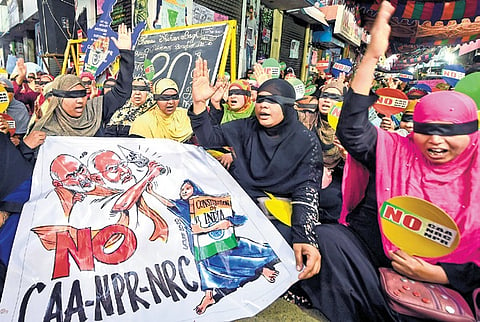

“This is a problem wherein the whole world has an interest. The fact of the matter is that millions of people who are called people of Indian origin are settled in Ceylon, not for a decade or two decades, but for centuries together. It has been stated that only the Indians there are people of Indian origin.”
— C N Annadurai in Rajya Sabha (1962-66)
In the post-2014 era, a shadow has fallen on the robust democracy India has proudly built since Independence. The BJP, which openly embraces the political ideology of Hindutva, faces a formidable test as its commitment to equality for all looms large. This ideological shift is reflected in legislative policies, leaning towards a form of muscular majoritarianism, ranging from the abrogation of Article 370 to the criminalisation of triple talaq, and opposing progressive Supreme Court judgements such as allowing menstruating women to enter the Sabarimala temple in Kerala.
Now, as the nation stands on the precipice of a general election, the Centre has made a pivotal move by notifying the Citizenship Amendment Rules, 2024, paving the way for the implementation of the controversial Citizenship Amendment Act (CAA) passed by Parliament in 2019. Many argue the Act’s unconstitutionality based on Article 14, asserting that laws must pass the reasonable classification test followed by the Supreme Court of India since the case of State of West Bengals vs Anwar Ali Sarkar in 1952 to as recently as Joseph Shine vs Union of India in 2018. This test requires the state to intelligently differentiate between similar groups and demonstrate that such distinctions serve the Act’s stated goals. Tamil Nadu also presented the matter in the SC, which I discuss ahead.
In a recent article, Amnesty India strongly criticised the current law and rules, asserting the legislation not only undermines the rights of certain communities but also deprives Tamils of Sri Lanka and immigrants from nations such as Nepal and Bhutan of deserved benefits. This stance underscores the broader implications of the law, raising concerns about its potential impact on diverse groups and the erosion of fundamental rights in India.
Amid this political turbulence, the Dravida Munnetra Kazhagam (DMK) stands firm in its opposition to the enforcement of CAA. It is a tool of discrimination based on religion and race, and the DMK vehemently asserts that the BJP is wielding them for political gain. Tamil Nadu’s CM M K Stalin minced no words, characterising the belated implementation of this Act as a desperate attempt by PM Modi to salvage a sinking ship, exploiting religious sentiments for political mileage. The CM asserts the people will never forgive the BJP for unleashing this act and condemns the AIADMK for shamelessly supporting it.
This is not the first time the DMK has resisted the implementation of the Act. When the party was in opposition, it staged protests against the CAA and conducted a signature campaign demanding the legislation be repealed, which was sent to the then President of India. After assuming power in 2021, the Tamil Nadu Legislative Assembly unanimously passed a resolution urging the Centre to repeal the CAA, 2019. Despite opposition from BJP members, the resolution stood as a testament to the state’s commitment to communal harmony.
In the pursuit of justice and fairness, the matter surrounding the CAA was also presented in the halls of the Supreme Court. At the heart of the argument was the assertion that the Act, in its current form, is arbitrary and discriminatory. The flaw lies in its selective consideration of religious minorities from three countries—Pakistan, Afghanistan, and Bangladesh.
A glaring oversight comes to light as Sri Lankan Tamils and Rohingya Muslims are excluded from the CAA’s protective umbrella. These refugees, who have found solace in India due to continued persecution, are left in limbo. The act narrows its focus to just six religions—Hindu, Sikh, Buddhist, Jain, Parsi, and Christian communities—excluding Muslims and Tamils of Indian origin. This is particularly disconcerting as it overlooks the plight of Tamil refugees settled in Tamil Nadu, who find themselves denied fundamental rights and privileges due to their non-citizenship and non-naturalised status.
By limiting its scope based on religion and nationality, the CAA perpetuates a system that leaves these communities marginalised and stripped of basic rights. And now, as the rules are being implemented, TN will ensure no community is discriminated against based on religion or race.
The debate on CAA and its controversial rules will keep going on forever. But in the pursuit of a resolution to the demographic challenge, the government must consider the human interest involved. It is imperative to ensure no person is left vulnerable, facing the prospect of statelessness simply because returning home is not a viable option. This calls for a compassionate and inclusive approach to citizenship, one that prioritises the protection of human rights and acknowledges the complexities of individual circumstances.
While acknowledging the concerns raised by various sections of society, it is essential to emphasise the importance of striking a balance between demographic considerations and human rights. The government has the responsibility to implement policies that not only address national concerns but also uphold the principles of fairness and justice. A citizenship regime should be designed to accommodate the nuances of individual situations, fostering an environment where no one is left in the shadows of statelessness.
(Views are personal)
Thamizhachi Thangapandian | Member of Lok Sabha and Standing Committee on IT & Communication